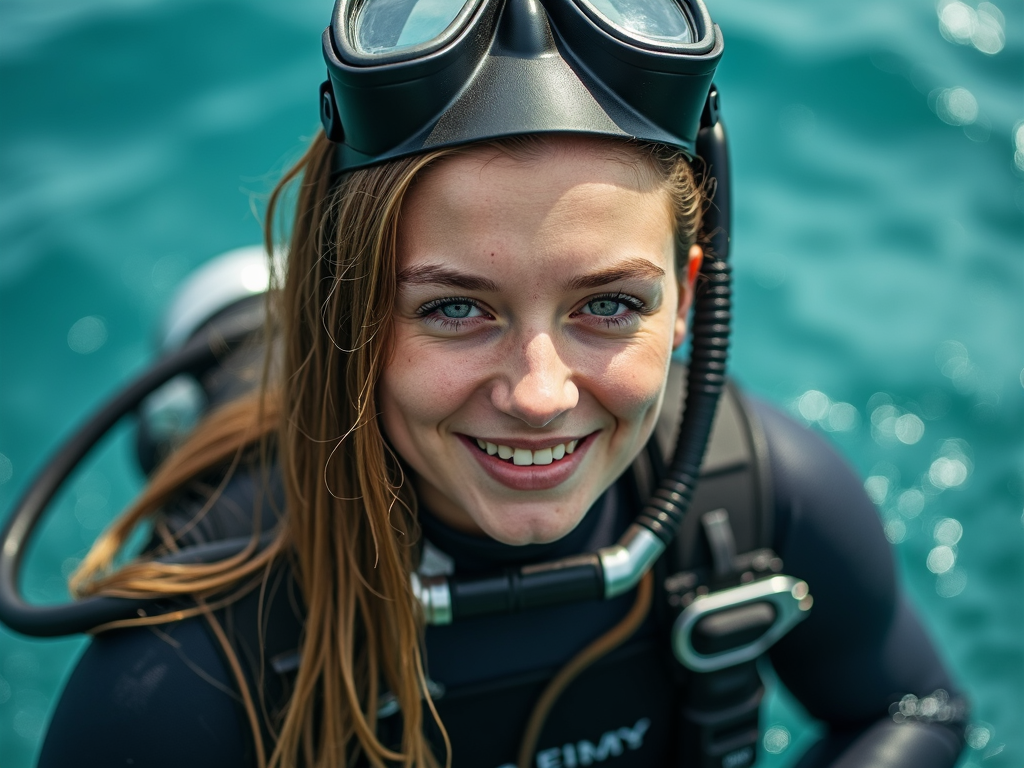The Ultimate Guide to Scuba Diving Helmets: All You Need to Know
Ins and outs of scuba diving helmets. Learn about types, benefits, and more.
Did you know that the first diving helmet was invented in 1823 by Charles and John Deane? Since then, these pieces of equipment have come a long way, and become one of the important parts for adventurers like you and me! In this article, we'll learn more about scuba diving helmets. We'll explore their types, features, and why they're so important for diving enthusiasts.

What is a Scuba Diving Helmet?
Scuba diving helmets are advanced underwater breathing apparatuses that allow divers to explore the ocean comfortably and safely. There are some types of helmets for divers to choose.
Types of Scuba Diving Helmets
Full-Face Masks
Full-face masks are the cool kids on the block when it comes to scuba diving helmets. They cover your entire face, giving you a wider field of vision and letting you breathe through your nose and mouth. Pretty nifty, right?
These masks are great for:
Divers who feel claustrophobic with traditional masks
Cold water diving (say goodbye to numb lips!)
Underwater communication (you can actually talk to your dive buddies)
Traditional Diving Helmets
When you think of old-school deep-sea diving, these are probably what come to mind. Traditional diving helmets are the big, round copper ones you see in vintage movies. While they're not as common in recreational diving, they're still used in commercial and military diving.
Key features:
Robust construction for deep diving
Built-in communication systems
Ability to stay underwater for extended periods
Lightweight Diving Helmets
Think of these as the middle ground between full-face masks and traditional helmets. Lightweight diving helmets offer more protection than a mask but are less bulky than their traditional counterparts.
Benefits include:
Better head protection
Improved comfort for long dives
Often used in scientific and industrial diving
How Scuba Diving Helmets Work
Now, let's get into the nitty-gritty of how these underwater equipments actually work. Don't worry – we'll keep it simple and fun!
Breathing System
The heart of any scuba diving helmet is its breathing system. It's like having your own personal atmosphere underwater. Here's how it works:
Air supply: Connected to tanks filled with compressed air or special gas mixtures
Regulators: Control the flow of air to match the water pressure
Exhaust valves: Let you breathe out and keep water from getting in
Visibility
What good is being underwater if you can't see the amazing sights? Scuba diving helmets use various methods to keep your vision clear:
Anti-fog coatings
Defog systems (fancy term for air circulation)
Wide viewports for panoramic views
Communication
Modern scuba diving helmets often come with built-in communication systems. It's like having an underwater phone!
Wired systems for clear communication with the surface
Wireless systems for talking to nearby divers
Some even have Bluetooth capabilities (because why not?)
The Benefits of Using a Scuba Diving Helmet
Improved Comfort and Safety
Scuba diving helmets provide a secure and comfortable fit, reducing the risk of leaks and providing that the diver can breathe easily. The full-face design also protects the eyes and face from water and debris, increasing overall safety.
Clear Communication
Many scuba diving helmets are equipped with communication systems that allow divers to stay in contact with their dive partners or surface team. This feature is pretty useful in commercial diving operations, where clear communication is important for safety and efficiency.
Better Visibility
Diving helmets often come with built-in lights and large, clear faceplates, providing better visibility underwater. This feature is especially beneficial for underwater photographers and videographers, who need a clear view of their subjects.
Challenges and Limitations of Using a Scuba Diving Helmet
While scuba diving helmets offer many benefits, they also come with some challenges:
Cost: Helmets are generally more expensive than traditional masks.
Weight and bulk: They can be heavier and more cumbersome to transport.
Learning curve: It takes time to get used to diving with a helmet.
Maintenance: Helmets require more maintenance than standard masks.
Limited availability: Not all dive shops carry or support helmet diving.
Reduced maneuverability: Some divers find helmets more restrictive than traditional masks.
Dependency on technology: Reliance on built-in systems can be a drawback if they malfunction.
Choosing the Right Scuba Diving Helmet
Picking the perfect scuba diving helmet is like choosing a new car – you want something that fits your needs and makes you look cool underwater. Here are some factors to consider:
Experience Level
Beginners: Start with a full-face mask for ease of use
Intermediate: Consider lightweight helmets for more protection
Advanced: You might want to try traditional helmets for specific diving tasks
Diving Environment
Warm water: Lighter options work well
Cold water: Go for helmets with better insulation
Deep diving: Choose helmets rated for your target depth
Comfort and Fit
Try before you buy (if possible)
Look for adjustable straps and padding
Consider your face shape and size
Budget
Entry-level full-face masks start around $500
High-end professional helmets can cost thousands
Remember, the best helmet is the one that keeps you safe and comfortable underwater. Don't be afraid to ask for advice from experienced divers or instructors.
Maintenance and Care
Taking care of your scuba diving helmet is crucial. After all, it's your lifeline underwater! Here are some tips to keep your helmet in tip-top shape:
Rinse with fresh water after every dive
Check seals and valves regularly
Store in a cool, dry place
Follow the manufacturer's maintenance schedule
Final Thoughts
Remember, the right helmet can make all the difference in your diving experience. So, take your time, do your research, and choose the one that fits your needs best. Who knows? Your next underwater adventure might just be your best one yet!
Ready to take the plunge? Grab your helmet and dive into the fascinating world beneath the waves. The ocean is calling – will you answer?
FAQ
What is a scuba diving helmet?
A scuba diving helmet is a piece of underwater equipment that covers the diver's head, providing protection, a steady air supply, and often communication capabilities. These helmets are crucial for both commercial and recreational diving.
Are scuba diving helmets only for professional divers?
No, scuba diving helmets are used by both professional and recreational divers. While traditional, heavy-duty helmets are more common in commercial diving, lightweight helmets and full-face masks are popular among recreational divers for their comfort and convenience.
How do I choose the right scuba diving helmet?
Consider your specific diving needs, the fit and comfort of the helmet, the availability of communication systems, and your budget. It's important to select a helmet that meets your safety requirements and enhances your diving experience.
How often should I maintain my scuba diving helmet?
You should clean and inspect your scuba diving helmet after each dive. Regular maintenance, including checking for wear and tear and proper storage, will ensure your helmet remains in good condition and extends its lifespan.
Can I wear glasses with a scuba diving helmet?
Many full-face masks and helmets can accommodate prescription lenses or inserts. Check with the manufacturer for specific options.

I'm a scuba enthusiast, and marine life lover. I enjoy writing about my diving adventures and sharing my knowledge with others.

I'm a passionate scuba diver and love to share my experiences with you. I enjoy writing about my experiences and sharing my knowledge with others.